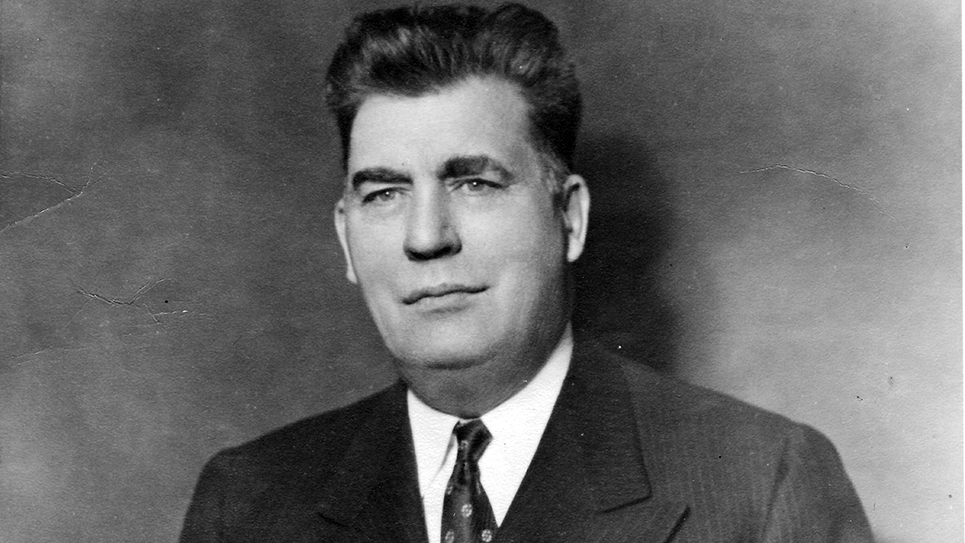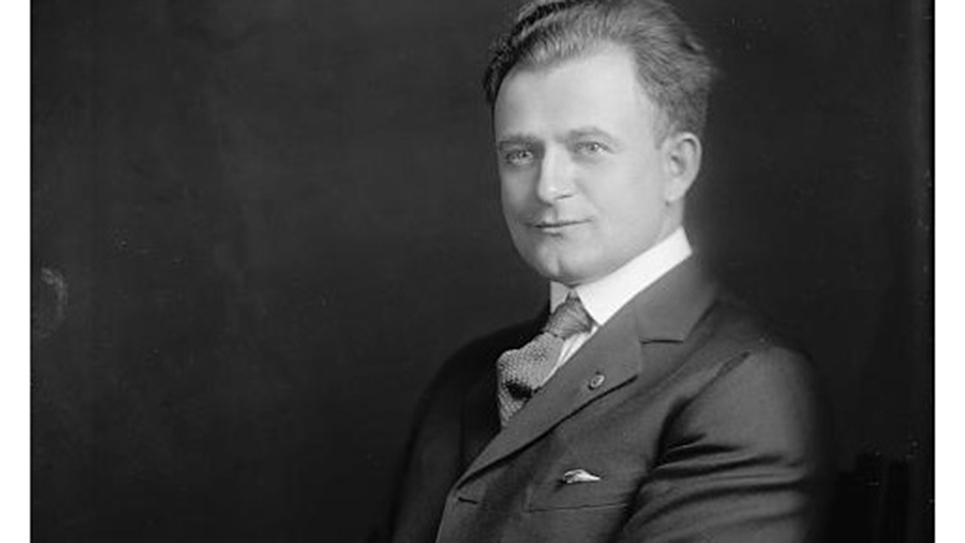‘Big Ed’ Johnson of Colorado
By Ray Hill
For the better part of two decades, Edwin Carl Johnson dominated the politics of Colorado. A hulking man over six feet tall with a thick, shaggy head of hair, Johnson was fondly known as “Big Ed” to his many friends in the Centennial State. Others referred to Johnson as the “Big Swede,” which was meant affectionately. Three times Coloradans elected Johnson as their governor, and three times they elected him to the United States Senate. There are those who believe Edwin C. Johnson was “the most noteworthy politician to come from Colorado in this century.” It was Ed Johnson who once told his colleagues on the floor of the Senate, “Out in my state, they call me the big, dumb Swede.”
Johnson lost his first campaign, a race for Moffat County superintendent of schools in 1914. It was the only campaign he lost in a political career that did not end until 1957. “Big Ed” continued to serve his state in various capacities and did not retire until suffering a heart attack at 85. A person of magnetic personality with a zest for politics, Ed Johnson was highly popular with the people of Colorado. Even in 1964, the old veteran was still campaigning, not for himself but rather for Congressman Wayne Aspinall. The Greely Daily Tribune noted, “Big Ed grinned his way into Greely with all the skill and finesse that 40 years in the political arena have given him.”
The newspaper related that a group of people had gathered waiting for the former governor’s arrival, and “Big Ed” got out of the car and took off his windbreaker, only to reveal a pair of bright red suspenders. Almost instantly, Johnson reminded folks why he had been so popular for so long. He began shaking hands and calling people by their first names.
TIME magazine, which routinely damned and demeaned any politician it deemed to be isolationist, wrote that Ed Johnson was no statesman, but grudgingly acknowledged him to be “a hardworking, courageous public servant,” as well as “an able politician whose sensitivity to public opinion” had carried him from railroad laborer to high office.
A Democrat, Ed Johnson’s political appeal transcended political parties, and his independent streak attracted support from many Republicans. Johnson had come to Colorado suffering from tuberculosis after having been born in Kansas and growing up on a cattle ranch in Nebraska. Johnson ran for the Colorado House of Representatives in 1922 and won. Johnson came to the State Capitol at a time when the Ku Klux Klan was attempting to permeate and control Colorado’s politics, and the young representative was an outspoken foe of the KKK. Johnson was elected lieutenant governor of Colorado in 1930. When Governor William “Billy” Adams chose not to run again in 1932, Johnson entered the race and won the Democratic nomination. “Big Ed” Johnson won the general election and was reelected to a second term in 1934.
Johnson opted to run for the U.S. Senate in 1936 as the incumbent, Edward Costigan, was ailing and chose not to run again. It was a great year for Democrats, and Johnson was popular in Colorado and went to the Senate. “Big Ed” Johnson proved not to be a stout New Dealer during his first six years in the United States Senate. Quite the contrary, Johnson was highly skeptical of much of the New Deal and was not at all afraid to voice his concerns. When Colorado’s senior senator, Alva Adams, died in 1941, Eugene Millikin was appointed and elected to the Senate. Millikin was a Republican, and the two men became well known for their mutual cooperation on behalf of their home state. Johnson and Millikin served as a bipartisan team where they functioned smoothly on behalf of the people of Colorado.
Senator Johnson was also not a supporter of President Roosevelt’s foreign policy prior to World War II. Johnson was more anti-interventionist in his outlook on America’s foreign relations. Johnson faced a serious opponent in his 1942 reelection campaign. First challenged inside the Democratic primary by New Dealers upset with the senator’s lack of fealty to Roosevelt, Johnson had to bat away his opposition, but the general election promised to be more difficult. Johnson’s opponent was Ralph Carr, the GOP governor of Colorado, who was an exceptionally able and courageous man. Carr, unlike Johnson, had been supportive of much of President Roosevelt’s foreign policy, while the senator had opposed it prior to the Japanese attack on Pearl Harbor. Yet the governor pounded hell out of FDR’s domestic policies. Carr has come to be remembered for his enlightened attitude regarding the internment of Japanese-American citizens during the Second World War. While most governors in the United States supported the idea of placing Japanese-Americans in internment camps, they profoundly opposed the idea of any such camps being located in their own state. Ralph Carr took the position that he was dead set against the idea of interning ANY American citizen. Carr also took the position that if indeed the Japanese-Americans were to be placed in an internment camp in Colorado, he would not fight having the camp located in his state and insisted that the residents of the camp be treated with respect and like human beings. Governor Carr’s insistence, “They are as loyal to American institutions as you and I,” was not universally popular, much less accepted throughout much of his state. That attitude almost certainly cost Ralph Carr the election. Edwin C. Johnson won with 50.2% of the votes cast, while Governor Carr tallied 49.2%. It was the closest election of Johnson’s statewide career.
Senator Johnson fired off a blast at President Roosevelt worthy of the most hidebound Republican. The Coloradan termed FDR’s decision to run for a third term “the greatest tragedy of American political history.” In 1944, Johnson lamented his party had been reduced to “one-man control.” Johnson said, “One man will name its candidate for President, its candidate for Vice President, and write its platform, just as was done in 1940.” Johnson pointed to the growing “running row” between President Roosevelt and Congress, saying it would likely end in “hopeless deadlock.”
While liberals inside his party didn’t like what he said, it did not impair Senator Johnson’s political standing back home. “Big Ed” won better than 70% of the ballots cast inside the Democratic primary in 1948 and won nearly 67% of the vote in the general election. Johnson’s GOP opponent that year was thought to be quite formidable. William Faust Nicholson was a 48-year-old investment banker who had upset former governor John C. Vivian inside the Republican primary. Nicholson was critical of Johnson’s conservatism and isolationism.
Senator Johnson shook the rafters of Hollywood’s movie industry when he was disappointed by his own favorite movie star, Ingrid Bergman. Bergman was a married woman and was having a torrid affair with the director of her latest film, Roberto Rossellini. Unfortunately for the couple, they had not been terribly discreet, and their romance was hardly a secret. “Big Ed” Johnson took to the floor of the United States Senate and acknowledged his fondness for Miss Bergman and sadly told his colleagues she had become “a powerful influence for evil.” Johnson described the actress as the “common mistress” of the Italian film director, “the vile and unspeakable” Rossellini, who, at least according to “Big Ed,” was nothing but a “common love thief.” A senator of the United States was no mere ordinary movie fan. Johnson introduced a bill that would have “policed the morals” of the moviemakers. That caught the attention of the movie moguls and their head lobbyist, Eric Johnston, accompanied by the cream of the studio heads, hurried to Washington, D.C. Eventually, Johnson was convinced the industry would tighten its standards and would police itself, but for a moment, Hollywood had suffered a serious case of the shakes.
In 1952, Senator Johnson backed the candidacy of Georgia U.S. Senator Richard Russell for the Democratic nomination for president. Johnson agreed to manage Russell’s campaign, which got nowhere outside the South.
Although many national Democrats did not like “Big Ed” Johnson’s rejection of liberalism, they confidently expected him to run again in 1954, and few thought he would have any difficulty in being reelected. Rarely did Ed Johnson ever do what was expected of him by those outside of Colorado.
Johnson was past 70 when he announced in 1954 that he would not run for the United States Senate. TIME, the most widely read new magazine in the world, attributed Johnson’s decision to his wife, Fern. The news weekly noted Senator Johnson was very popular in his home state and likely could be reelected to the Senate easily. “Democrats underestimated the power of plump, matronly Fern Armitage Johnson, wife (for 47 years) of Colorado’s Democratic Senator Edwin Johnson.” Evidently, Miss Fern pined to return to the mountains and greenery of the Centennial State. “Mrs. Johnson has developed a complex about living longer in Washington, so retirement is a must,” “Big Ed” declared. TIME reported that, although 70, the senator was “still healthy and hardworking.” The reporter for TIME thought Johnson seemed a bit “wistful” about leaving the United States Senate, while Fern squeezed his hand and was “just wild with joy” at the prospect of heading home to Colorado. Johnson’s retirement put his Senate seat into play.
Summoning reporters to his office, along with his office staff, Senator Johnson said, “In spite of my years, my health is good and no one could possibly enjoy being a senator more than I.” Yet Johnson added, “There are a lot of younger, capable and available young men back in my state. One of them will take my place.” Lest anyone try to talk him out of leaving the U.S. Senate, Johnson barked that his decision was “final and irrevocable.”
Weeks after his announcement that he would not seek reelection to the Senate, “Big Ed” dropped another political bombshell. Johnson sent a letter to the chairman of Colorado’s Democratic State Executive Committee saying he was running for governor of Colorado and was making his announcement to “clear the political atmosphere.” Johnson acknowledged there were numerous reasons why he shouldn’t run, but “none are insurmountable.” The senator wrote, “Colorado needs a strong and experienced hand at her helm and I am confident that I can do the job.” Johnson wrote he expected the primary and general elections to be hotly contested and thought “that is as it should be.”
“I do not believe in drafts, or shut outs, or slates or political bargains and will have no part of any of them,” Johnson stated in his letter. “No candidate for any public office owes me anything, nor I them, and I shall not take part in any degree, directly or indirectly in any one’s race for any office.”
Ed Johnson won the election but suffered a heart attack, which caused him to decide to end his time seeking elective office. Johnson remained active and vigorous for years.
On May 7, 1970, the former governor went to the hospital in Denver. Four days later, Johnson underwent a hernia operation and by May 26, his condition had deteriorated considerably. Doctors pronounced Johnson to be in critical condition. The 86-year-old Johnson continued to fade and died on May 30, 1970.
“Big Ed” Johnson’s body was taken to the rotunda of the State Capitol, where he lay for citizens to pay their respects.
An editorial appearing in the Greely Daily Times summed up Ed Johnson’s public service: “Johnson was a Democrat – – – but not a rubber stamp Democrat. He was a man of his own mind and he acted according to his own beliefs and according to what he believed was right, and sometimes rubbed the grain of party members and leaders the wrong way, but his honesty and sincerity won him widespread respect and admiration.” The newspaper acknowledged that Johnson believed in and enjoyed working for the betterment of his state. And he did it in a distinctive and unforgettable manner.”
© 2025 Ray Hill







